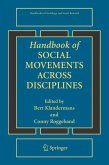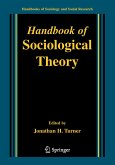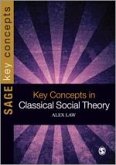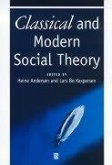Handbook of Classical Sociological Theory
Herausgegeben:Abrutyn, Seth; Lizardo, Omar
Handbook of Classical Sociological Theory
Herausgegeben:Abrutyn, Seth; Lizardo, Omar
- Broschiertes Buch
- Merkliste
- Auf die Merkliste
- Bewerten Bewerten
- Teilen
- Produkt teilen
- Produkterinnerung
- Produkterinnerung
This is the first handbook focussing on classical social theory. It offers extensive discussions of debates, arguments, and discussions in classical theory and how they have informed contemporary sociological theory. The book pushes against the conventional classical theory pedagogy, which often focused on single theorists and their contributions, and looks at isolating themes capturing the essence of the interest of classical theorists that seem to have relevance to modern research questions and theoretical traditions. This book presents new approaches to thinking about theory in relationship to sociological methods.…mehr
Andere Kunden interessierten sich auch für
![Handbook of Classical Sociological Theory Handbook of Classical Sociological Theory]() Handbook of Classical Sociological Theory245,99 €
Handbook of Classical Sociological Theory245,99 €![Handbook of Social Movements Across Disciplines Handbook of Social Movements Across Disciplines]() Conny Roggeband / Bert Klandermans (eds.)Handbook of Social Movements Across Disciplines112,99 €
Conny Roggeband / Bert Klandermans (eds.)Handbook of Social Movements Across Disciplines112,99 €![Sociological Theory Sociological Theory]() Alessandro OrsiniSociological Theory50,99 €
Alessandro OrsiniSociological Theory50,99 €![Handbook of Sociological Theory Handbook of Sociological Theory]() Jonathan H. Turner (ed.)Handbook of Sociological Theory62,99 €
Jonathan H. Turner (ed.)Handbook of Sociological Theory62,99 €![Key Concepts in Classical Social Theory Key Concepts in Classical Social Theory]() Alex LawKey Concepts in Classical Social Theory182,99 €
Alex LawKey Concepts in Classical Social Theory182,99 €![Beginning classical social theory Beginning classical social theory]() Marcel StoetzlerBeginning classical social theory22,99 €
Marcel StoetzlerBeginning classical social theory22,99 €![Classical and Modern Social Theory Classical and Modern Social Theory]() Classical and Modern Social Theory202,99 €
Classical and Modern Social Theory202,99 €-
-
-
This is the first handbook focussing on classical social theory. It offers extensive discussions of debates, arguments, and discussions in classical theory and how they have informed contemporary sociological theory. The book pushes against the conventional classical theory pedagogy, which often focused on single theorists and their contributions, and looks at isolating themes capturing the essence of the interest of classical theorists that seem to have relevance to modern research questions and theoretical traditions. This book presents new approaches to thinking about theory in relationship to sociological methods.
Produktdetails
- Produktdetails
- Handbooks of Sociology and Social Research
- Verlag: Springer / Springer International Publishing / Springer, Berlin
- Artikelnr. des Verlages: 978-3-030-78207-8
- 1st edition 2021
- Seitenzahl: 736
- Erscheinungstermin: 3. November 2022
- Englisch
- Abmessung: 254mm x 178mm x 40mm
- Gewicht: 1359g
- ISBN-13: 9783030782078
- ISBN-10: 3030782077
- Artikelnr.: 65999722
- Herstellerkennzeichnung Die Herstellerinformationen sind derzeit nicht verfügbar.
- Handbooks of Sociology and Social Research
- Verlag: Springer / Springer International Publishing / Springer, Berlin
- Artikelnr. des Verlages: 978-3-030-78207-8
- 1st edition 2021
- Seitenzahl: 736
- Erscheinungstermin: 3. November 2022
- Englisch
- Abmessung: 254mm x 178mm x 40mm
- Gewicht: 1359g
- ISBN-13: 9783030782078
- ISBN-10: 3030782077
- Artikelnr.: 65999722
- Herstellerkennzeichnung Die Herstellerinformationen sind derzeit nicht verfügbar.
Seth Abrutyn is an Associate Professor in the Department of Sociology at the University of British Columbia. Abrutyn's work focuses on the interplay between institutional structure, bounded social spaces like schools or communities, and social emotions and behaviour. He has published on a diverse array of topics including suicide, social psychology, religious evolution, and more general topics of contemporary and classical sociological theory. His work can be found in venues such as American Sociological Review, Sociological Theory, American Journal of Public Health , and Journal of Health and Social Behavior. Omar Lizardo is a Professor of Sociology at the University of California, Los Angeles. His research deals with various topics at the intersection of cultural sociology, stratification, social theory and the theory of action. He has published widely the classical and contemporary social theory, network analysis, the sociology of taste, cultural capital theory, and processes of distinction and symbolic exclusion. His work has appeared in such venues as American Sociological Review, Theory and Society, Sociological Science, Socius, Sociological Theory, and Social Forces.
Part I. Overarching Questions.- Chapter 1. The Methods and Surprises of Sociological Theory (G.Jasso).- Chapter 2. Modernity as a classical question in sociological theory (C. Silla).- Chapter 3. Evolutionary Theorizing in Sociology's Formative Period (J. Turner).- Chapter 4. Selfing: Integrating Pragmatism and Phenomenology to Develop a Multi-Processing Theory of the Self (E. Summers-Effler).- Chapter 5. The Sociology of W.E.B. Du Bois (A. Morris).- Part II. Central Dynamics.- Chapter 6. Does Differentiation Matter to Sociology Anymore? (S. Abrutyn).- Chapter 7. Power, Regulation and Social Order in the Intersection of Political and Social Theory (R. Heiskala).- Chapter 8. Hermeneutics and Performance in Social Theories of Power (I. Reed).- Chapter 9. From Simmel to Relational Sociology (S. Mützel ).- Chapter 10. Reflections on Class and Social Inequality: Sociology and Intersectionality in Dialogue (P.H. Collins).- Part III. Spheres of Social Life.- Chapter 11. The Sociology of Kinship (A. Maryanski).- Chapter 12. Mediating the Sacred: Thinking through Religious Experience in the Classics and Beyond (M.Pagis).- Chapter 13. Polity (E. Clemens).- Chapter 14. Theoretical Lineages and Contemporary Concerns in the Sociology of Economic Life (S. Mudge).- Chapter 15. Law in Classical Sociological Theory: Coercion, Ideology, and Change (E. Cornelius).- Chapter 16. Education (J. Guhin).- Chapter 17. Art or the Aesthetic? The Relevance of the Classical Sociology of Art for the Current Sociology of Culture (B. Merriman).- Part IV. Theorizing New Social Forms.- Chapter 18. Urbanization Theorizing (T. Clark).- Chapter 19. Crowds and Collective Behavior (C. Borch).- Chapter 20. Strands of Classical Theory in the Study of Social Movements (D. McAdam).- Chapter 21. Organizations: Theoretical Debates and the Scope of Organizational Theory (N. Fligstein).- Chapter 22. Democracy, Civil Sphere, Mass Society (P. Kivisto).- Chapter 23. The Other as Real, Imagined and Political (C. Decoteau).- Part V. Interactions, Symbols, and Psyche.- Chapter 24. Empathy, Intersubjectivity and the Self (N. Ruiz).- Chapter 25. Symbol Systems and Social Structures (V. Leschziner).- Chapter 26. Consciousness and Unconsciousness (L. Chancer).- Part VI. Identifying Conceptual Threads.- Chapter 27. Enculturing the Classics (O. Lizardo).- Chapter 28. Morality and Sociological Theory (S. Hitlin).- Chapter 29. Cognition, Practice and Learning in the Discourse of the Human Sciences (M. Strand).- Chapter 30. On the Other Side of Interests: The Rise of Values and their Transformation into Disinterest (J. Martin).- Chapter 31. The Cognitive Dimension (S. Turner).
Part I. Overarching Questions.- Chapter 1. The Methods and Surprises of Sociological Theory (G.Jasso).- Chapter 2. Modernity as a classical question in sociological theory (C. Silla).- Chapter 3. Evolutionary Theorizing in Sociology's Formative Period (J. Turner).- Chapter 4. Selfing: Integrating Pragmatism and Phenomenology to Develop a Multi-Processing Theory of the Self (E. Summers-Effler).- Chapter 5. The Sociology of W.E.B. Du Bois (A. Morris).- Part II. Central Dynamics.- Chapter 6. Does Differentiation Matter to Sociology Anymore? (S. Abrutyn).- Chapter 7. Power, Regulation and Social Order in the Intersection of Political and Social Theory (R. Heiskala).- Chapter 8. Hermeneutics and Performance in Social Theories of Power (I. Reed).- Chapter 9. From Simmel to Relational Sociology (S. Mützel ).- Chapter 10. Reflections on Class and Social Inequality: Sociology and Intersectionality in Dialogue (P.H. Collins).- Part III. Spheres of Social Life.- Chapter 11. The Sociology of Kinship (A. Maryanski).- Chapter 12. Mediating the Sacred: Thinking through Religious Experience in the Classics and Beyond (M.Pagis).- Chapter 13. Polity (E. Clemens).- Chapter 14. Theoretical Lineages and Contemporary Concerns in the Sociology of Economic Life (S. Mudge).- Chapter 15. Law in Classical Sociological Theory: Coercion, Ideology, and Change (E. Cornelius).- Chapter 16. Education (J. Guhin).- Chapter 17. Art or the Aesthetic? The Relevance of the Classical Sociology of Art for the Current Sociology of Culture (B. Merriman).- Part IV. Theorizing New Social Forms.- Chapter 18. Urbanization Theorizing (T. Clark).- Chapter 19. Crowds and Collective Behavior (C. Borch).- Chapter 20. Strands of Classical Theory in the Study of Social Movements (D. McAdam).- Chapter 21. Organizations: Theoretical Debates and the Scope of Organizational Theory (N. Fligstein).- Chapter 22. Democracy, Civil Sphere, Mass Society (P. Kivisto).- Chapter 23. The Other as Real, Imagined and Political (C. Decoteau).- Part V. Interactions, Symbols, and Psyche.- Chapter 24. Empathy, Intersubjectivity and the Self (N. Ruiz).- Chapter 25. Symbol Systems and Social Structures (V. Leschziner).- Chapter 26. Consciousness and Unconsciousness (L. Chancer).- Part VI. Identifying Conceptual Threads.- Chapter 27. Enculturing the Classics (O. Lizardo).- Chapter 28. Morality and Sociological Theory (S. Hitlin).- Chapter 29. Cognition, Practice and Learning in the Discourse of the Human Sciences (M. Strand).- Chapter 30. On the Other Side of Interests: The Rise of Values and their Transformation into Disinterest (J. Martin).- Chapter 31. The Cognitive Dimension (S. Turner).








